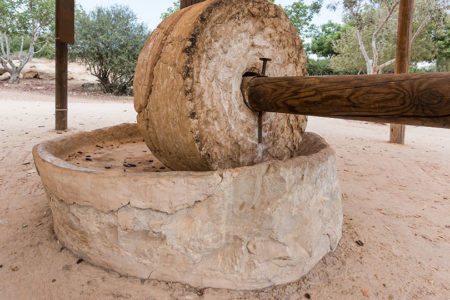The Great Transition: From the Cross to the Great White Throne
People have it all wrong these days. Repeatedly we hear men and women talk calmly about their “near death” experiences, about seeing that inviting, great white light at the end of the tunnel. “No fear of death,” they say, just the twinge of regret at being forced to return to the humdrum activities of life on earth.
A few are even claiming to have entered a higher sphere and communed with friends and relatives who have gone on before. These types were once ridiculed by cynics in the media and people whose minds they shaped on issues related to eternity and things spiritual. These days, for millions of people death wears a smiley face. The soaring rise in teenage suicides and numbers of people who want to employ the services of “Dr. Death” points to that fact. You see, contemporary culture is successfully selling the idea that if you take your life, you’ll probably get a better ride the next time around.
While it is true that we have been hit by a blizzard of psychics, channelers, reincarnationists of various stripes, and show business luminaries leading the way into ever more bizarre religious cults, much of the blame must be laid at the doors of our churches. This may seem like a threadbare thing to say, but it is true. It seems that across the board it is increasingly rare to hear sermons on the subjects of death, hell, and judgment to come. In the age of “feel good,” these topics are not high on the list of things people want to hear. Making it in the here and now—happy families, self-fulfillment, managing our affluence, and tolerance for variant religious systems—is currently the name of the religious game. “You’re OK; I’m OK.” That’s the ticket to a more tranquil life filled with socially relevant relationships.
Accepting, regardless of who promotes it, a lifestyle devoid of much thought for the serious aspects of eternity embodies at least two extremely serious errors. First, there is the fact that the world is exploding around us. Ignoring the prophetic aspects of Scripture, as millions of people who call themselves evangelical Christians are doing, is losing sight of the urgency of our mission on earth. Second, there is the matter of turning a deaf ear to millennia of biblical revelation and corresponding history mandating the need to prepare for the certainty of death and the reality of judgment to come. All pop religious deviations aside:
“It is appointed unto men once [not again and again] to die, but after this the judgment” (Heb. 9:27).
God’s Grace; Mankind’s Folly
It is astonishing to realize, in view of the clear teaching of Scripture, that religion has so persistently flown in the face of God by rejecting the divine provision for eternal salvation. This is the most visible evidence of mankind’s arrogant obsession to complicate what God has chosen to make so simple. Simple for us, yes—for Him, no.
The Necessity of Redemption
From the simple stone altars of Israel’s ancient patriarchs to the bellowing flames of the grand altars of its magnificent Temples, there was always the sacrifice. Sacrifices and the accompanying imperative of redemption were central to Jewry’s relationship to the Creator God and assurance of a continuing, eternal relationship. Without the sacrifice, there was no hope of redemption or relationship to the Almighty.
“For the life of the flesh is in the blood; and I have given it to you upon the altar to make an atonement for your souls; for it is the blood that maketh an atonement for the soul” (Lev. 17:11).
“And almost all things are by the law purged with blood, and without shedding of blood is no remission” (Heb. 9:22).
Considering all of the questions raised about the whys and wherefores of the necessity of blood sacrifices, suffice it to say that our minds can be completely at rest. Redemption banishes fear; the God-chosen sacrifice establishes peace.
There is a marvelous Old Testament passage that tells us, once and for all, the Lord’s intention through redemption. The word came to Israel in one of its darkest hours. There was a Babylon in its future, and the nation was to pass through the bloody waters of fire, siege, and the long trek into captivity. But God issued the message that, in spite of it all, they were not to be afraid.
“But, now, thus saith the Lᴏʀᴅ who created thee, O Jacob, and he who formed thee, O Israel, Fear not; for I have redeemed thee, I have called thee by thy name; thou art mine” (Isa. 43:1).
In context, they were reminded that they would pass through fire, flood, and scatterings. But in spite of it all, there was nothing to fear. Why not? Why not, indeed. One phrase makes the difference: “for I have redeemed thee.” This redemption was not of their doing. God’s initiative carried it out. God Himself was to be the Redeemer. Such is the genius of divine redemption.
Jesus Paid It All
That God Himself would become the Redeemer stuns the mind of mankind. The Jewish people—steadfast guardians of the faith of our fathers—still have not come to grips with this truth, although a search of their Old Testament Scriptures leaves no doubt about what was to occur in the final sacrifice for sin.
“Surely,” the Father says, “he [the Son] hath borne our griefs, and carried our sorrows; yet we did esteem him stricken, smitten of God, and afflicted. But he was wounded for our transgressions, he was bruised for our iniquities; the chastisement for our peace was upon him, and with his stripes we are healed. All we like sheep have gone astray; we have turned every one to his own way, and the Lᴏʀᴅ hath laid on him the iniquity of us all” (Isa. 53:4–6).
We continually return to Isaiah 53 because it says all that needs to be said on the subject. It stands at the pinnacle of every revelation related to sacrifice and redemption in the Old Testament. In this passage, all of the shrouded mysteries of the magnificent transaction are clarified. Judgment—the entirety of the pent-up wrath of God—would be poured out on the suffering Messiah. This was the day of the great sin offering: “Yet it pleased the Lᴏʀᴅ to bruise him; he hath put him to grief. When thou shalt make his soul an offering for sin…He shall see of the travail of his soul, and shall be satisfied” (Isa. 53:10–11).
Furthermore, He was “wounded for our transgressions…our iniquities…our peace.” The net result is found in the fact that “with his stripes we are healed”! Seldom has such monumental truth been bound up in so few words. We who believe in His finished work are fully and finally redeemed. His life has become ours—“with his stripes we are healed”!
A few weeks ago I witnessed a kidney transplant. Both of the kidneys of a young man had ceased to function. In separate operating rooms in the same hospital, two men were prepared for surgery. One was the young man with the dysfunctional kidneys. The other was his father, who was to be the donor. When the father’s kidney was successfully removed, one of the surgeons took the healthy donor kidney in his hands. As he was leaving the room, he said, “I am carrying life to the patient in the other room.” Of course, in a very dramatic sense, he was. Inadequate as the analogy may be, it carries shadows of what Christ has done for us. He was judged worthy to bear our stripes, so that by His suffering He could impart His life to believers—Jew and Gentile—the world over.
The New Testament captures the fullness of what it meant for Christ to be judged in such a way that it would be possible for Him to bear the weight of our sin, death, judgment, and hell so that we might experience full and free redemption.
“Let this mind be in you, which was also in Christ Jesus, Who, being in the form of God, thought it not robbery to be equal with God, But made himself of no reputation, and took upon him the form of a servant, and was made in the likeness of men; And, being found in fashion as a man, he humbled himself and became obedient unto death, even the death of the cross” (Phil. 2:5–8).
Think of it. Because He became sin for us, we will never face any aspect of the wrath and judgment of God. Wonder of the ages—Jesus paid it all!
The Great Transition
But there is another side to the picture. And for those who refuse to believe, it is a very grim picture indeed. The Philippian passage goes on to say:
“Wherefore, God also hath highly exalted him, and given him a name which is above every name, That at the name of Jesus every knee should bow, of things in heaven, and things in earth, and things under the earth, And that every tongue should confess that Jesus Christ is Lord, to the glory of God, the Father” (Phil. 2:9–11).
The suffering Messiah will never be seen that way again. His work on the cross was an eternal, once-for-all phenomenon. He was put to grief and judged for a purpose. That purpose is found in three resounding realities:
- Jesus will be exalted as “King of kings, and Lord of lords” (1 Tim. 6:15).
- Every creature in the universe, saved or lost, will pay homage—bend the knee—to Him (Phil. 2:10).
- The Father, through the exaltation of Christ, will receive the glory that is His due (Phil. 2:11).
Whosoever Shall Call
His death opened the door of opportunity for Jews and Gentiles the world over. Never would another sacrifice be necessary. By 70 A.D., when the Temple in Jerusalem was destroyed by the Romans, the era of the altar of sacrifice was ended. The divine program was moving on. The new program was to gather His church through the message of redemption heralded by Jesus Christ, the apostles, and then believers. That message would be based on simple acceptance of a free gift—eternal life through Jesus Christ, our Lord.
For those who refuse to believe, there is a day coming in which every knee will bow to the sovereignty of Jehovah’s Messiah, the Savior.
The Great White Throne Judgment
There is a sense in which this event, described in Revelation 20:11–15, is a concluding act. It will take place one thousand years after the resurrection of the redeemed. By this time, all of the judgments described in the articles to follow will have taken place. Even the Devil himself will have been consigned to the “lake of fire and brimstone” (Rev. 20:10).
The Christ who suffered for our sins will sit upon the throne of judgment. It will literally be a time when there will be no place for Christ’s rejecters to hide. In this final resurrection—the resurrection of the unsaved dead—the sea, the grave, death, and hades will deliver up their captives to face their eternal appointment.
It will be the climactic hour when “every knee shall bow.” Let it be clearly understood that this bowing of the knee will have nothing to do with salvation. That will not be offered there. The day of grace, so long taken for granted, will have ended. It will be payday.
“And the books were opened; and another book was opened, which is the book of life. And the dead were judged out of those things which were written in the books, according to their works” (Rev. 20:12).
The books stand as witnesses to the degree of guilt borne by the offenders. Perhaps a modern parallel is found in the use of video cameras against offenders in court. It is of little use to argue innocence when the act has been taped for everyone to see. No one who stands before the Great White Throne will be exonerated.
“And whosoever was not found written in the book of life was cast into the lake of fire” (Rev. 20:15).
There it stands—a text laying bare the most solemn truth faced by men and women of all generations. No, it does not provide comforting message material—no smiley faces here. However, Jesus told us that when the Spirit of God came into the world, He would “reprove the world of sin, and of righteousness, and of judgment” (Jn. 16:8). It is for us to believe and proclaim “all the counsel of God” (Acts 20:27).
Many years ago, a man well along in life made a decision to receive Christ. I asked him why it had taken so many years for him to trust the Savior. “You know,” he said, “I’ve been asking myself that same question, and I think I’ve figured it out. For all of these years I’ve been making it harder than God did.”
Millions of people are doing the same thing. Don’t let it happen to you.







